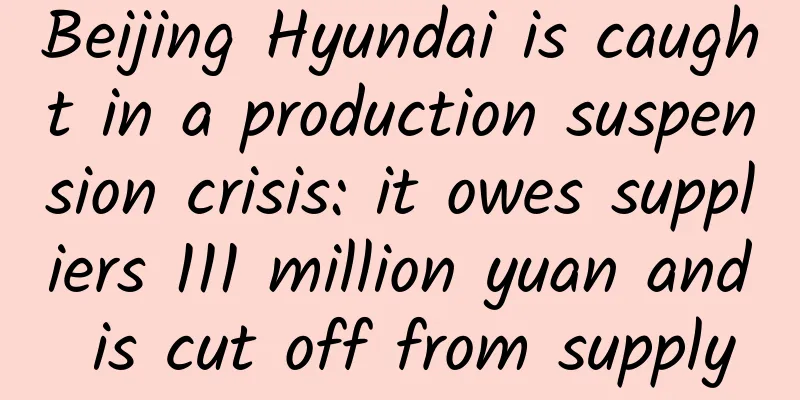Beijing Hyundai is caught in a production suspension crisis: it owes suppliers 111 million yuan and is cut off from supply

|
Beijing Hyundai, which has surpassed the annual sales threshold of one million vehicles for five consecutive years, has taken a sharp turn for the worse in this year's auto market. On August 29, Beijing Hyundai was exposed to the news that four factories had stopped production due to overdue payments to suppliers. Although Beijing Hyundai revealed on August 30 that the four factories had resumed production one after another, the issue of arrears was still under negotiation. Yan Jinghui, an expert consultant of the Auto Dealers Chamber of Commerce of the All-China Federation of Industry and Commerce, believes that the shutdown caused by arrears reflects that Beijing Hyundai is facing a crisis. Since the beginning of this year, Beijing Hyundai's sales have fallen off a cliff. The "THAAD" system factor is only one of the reasons for the decline in sales, and product sluggishness and lack of product strength are the core. How to launch products that are more in line with the car purchasing preferences of Chinese consumers and improve product competitiveness has become a difficult problem that Beijing Hyundai urgently needs to solve. Four factories shut down Beijing Hyundai, which has been in the Chinese market for 15 years, has encountered a production suspension crisis for the first time. The supplier that caused Beijing Hyundai to stop production is called Beijing Inergy. According to a letter issued by the company, due to Beijing Hyundai's failure to pay for goods amounting to 111 million yuan, it has insufficient operating funds and will stop supplying goods to Beijing Hyundai from August 22. It is understood that Beijing Hyundai has not paid for goods to the company for 6 months. At present, Beijing Inergy's total sales are 850 million yuan, of which sales from Beijing Hyundai have reached 580 million yuan, accounting for 68% of the total sales. It is understood that Beijing Inergy is the full name of Beijing Plastic Inergy Automotive Systems Co., Ltd., and its main business scope is the production of plastic fuel systems, including fuel tanks, fuel filling pipes, gasoline and diesel fuel pumps, etc. According to the list of suppliers of Beijing Hyundai, Beijing Inergy is the supplier of plastic fuel tanks for Beijing Hyundai. This means that from August 22, four factories of Beijing Hyundai began to lack this component. Currently, Beijing Hyundai has a total of 4 factories in production, 3 in Beijing and 1 in Cangzhou. This year, Beijing Hyundai's fifth factory was established in Chongqing, but it is still in the debugging stage and has not really been put into production. Industry insiders said that there are tens of thousands of parts in a new car, and the lack of supply of any one of them will have an impact on vehicle manufacturing. In fact, the suspension of production at Beijing Hyundai is not unrelated to the decline in sales. After reaching its peak in 2012, Beijing Hyundai's sales began to decline gradually. According to data from the National Passenger Vehicle Information Joint Conference, Beijing Hyundai's total sales in the first seven months of this year were only 415,000 vehicles, a year-on-year decrease of 29.1%. At the beginning of this year, Beijing Hyundai set a full-year sales target of 1.25 million vehicles, but the sales performance in the first half of this year only achieved 33.2% of the target. Previously, Beijing Hyundai had lowered its full-year sales target to 800,000 vehicles. In addition, at the end of July this year, four factories also stopped production. At that time, Beijing Hyundai responded that due to the high temperature holiday, the Beijing Hyundai factory stopped production from July 31 to August 4. However, the Beijing factory did not resume production as scheduled, but more than ten days later than originally planned, which means that Beijing Hyundai's factory has been shut down continuously. It is understood that after the Chongqing factory is put into production, Beijing Hyundai's total production capacity will increase to 1.6 million vehicles. Yan Jinghui said that Beijing Hyundai's large amount of idle production capacity has released a dangerous signal. Dealer confidence is low An insider of Beijing Hyundai admitted that the existing inventory can be gradually digested during the suspension of production at Beijing Hyundai’s factory. Fan Jingtao, director of the Sales Management Office of Beijing Hyundai Motor Company, said at this year's Chengdu Auto Show that in response to the high inventory pressure on dealers, Beijing Hyundai sacrificed the manufacturer's wholesale data to relieve the pressure on dealers; in order to ease the pressure on dealers' capital turnover, through active communication with financial institutions and manufacturer guarantee measures, the healthy operation of dealers' funds was guaranteed. Under the difficult situation in the first half of the year, no dealer had a capital shortage or quit the network. At the same time, in response to the existing sales model, dealers are actively encouraged to change from "sitting sales" to "marketing" actively, resolutely go out to find customers, actively attract customers, and restore confidence. However, the confidence of Beijing Hyundai dealers is still insufficient. A Beijing Business Daily reporter saw in a Beijing Hyundai 4S store that there were no consumers coming to see the car, and the salesperson was idly flipping through his mobile phone. At present, the discount for the main models in the store is about 30,000 yuan, and there are not many choices of models on sale. Some models need to be booked, and the booking cycle is about 2 weeks. A salesperson said that since the eighth generation of Sonata, the discount of Beijing Hyundai models has been at a high level. The once popular iX25 model has experienced a short-term increase in price, but it was quickly returned to its "original form" and restored to a high discount state. "Due to the large discount, Beijing Hyundai dealers have been relying on completing the annual sales task to get the manufacturer's rebate and after-sales to achieve profitability. Now Beijing Hyundai's models are not selling well, and dealers dare not increase discounts to compete with other models, as that would lose more." said the above salesperson. At the same time, regarding the situation where some models with certain configurations need to be reserved, the salesperson admitted that it is not because the supply of cars is tight, but that dealers dare not import too many cars. Basically, they are display cars in the showroom, plus a few models for sale in the garage. If too many new cars are submitted to the manufacturer and cannot be sold, it will occupy a lot of funds. Therefore, some models with certain configurations only accept consumer orders, and then pick up the car from the manufacturer. Earlier, the China Automobile Dealers Association released the "2017 First Half Auto Brand Confidence Index Research", which showed that among the 12 brands that dealers lacked confidence, Beijing Hyundai was among them. Among them, the number of 4S stores entering the store once dropped by 50%, and online sales leads also dropped by 50%-60% compared with the previous period. Product strength needs to be improved Industry insiders believe that the THAAD system, the decline of luxury brands, and the rise of domestic brands have made Beijing Hyundai feel tremendous pressure in recent years. The suspension of production due to overdue payments is just one of the many straws that broke the camel's back for Beijing Hyundai. Faced with the current fiercely competitive domestic auto market, the cost-effectiveness advantage that Beijing Hyundai has always relied on can no longer attract consumers' attention. Improving the core competitiveness of products is one of the means to boost sales. Previously, Beijing Hyundai achieved annual sales of one million vehicles for many consecutive years, relying on the excellent cost-effectiveness of its models. Facing the post-million-vehicle era, Beijing Hyundai has stated that while increasing the proportion of mid-to-high-end cars, SUVs, and turbocharged models, it has also deployed models such as Elantra, Tucson, and Sonata in various market segments to cope with the trend of increasingly segmented car purchases by consumers. However, in the current situation where domestic brands are consolidating the existing market and breaking through upwards, and luxury brands are seizing the market downwards, the cost-effectiveness of Beijing Hyundai's models, which is simply based on lower prices than joint venture brands of the same level, is no longer effective. Data shows that in the first seven months of this year, Beijing Hyundai sold 127,300 cars, accounting for 31% of total sales. Among them, Sonata, which was once a hot-selling model in the B-class car market, sold only 7,138 units. At the same time, among the A-class models with the highest sales share of Beijing Hyundai, the average monthly sales of the previous Elantra and Langdong models exceeded 10,000 units. However, the sales of the Elantra, which was launched last year, exceeded 10,000 units in the month of its launch last year, and its current sales situation is not optimistic. In addition, the sales of the Verna dropped to 5,500 units three months after its launch. At the same time, in the SUV field that all car companies rely on, the sales of Beijing Hyundai's models are not optimistic. Data shows that in the first seven months of this year, Beijing Hyundai's SUV sales were 287,700 units, accounting for 69% of the total sales. According to data released by the National Passenger Car Information Joint Conference, in the domestic SUV sales list in the first five months of this year, Beijing Hyundai Tucson ranked only 33rd, and this model is also the best-selling model among the four SUV models currently on sale by Beijing Hyundai. Industry insiders believe that Beijing Hyundai models once attracted a large number of consumers by relying on their cost-effectiveness. However, the current car-buying concept of domestic consumers has changed. From the initial enthusiasm for turbocharged engines, SUVs, and high-tech in the car, they have become multi-faceted considerations of the product strength of the model when buying a car. Beijing Hyundai models should not simply rely on cost-effectiveness, but need to launch products that are more in line with consumers' car buying preferences in order to get out of the current sales quagmire. As a winner of Toutiao's Qingyun Plan and Baijiahao's Bai+ Plan, the 2019 Baidu Digital Author of the Year, the Baijiahao's Most Popular Author in the Technology Field, the 2019 Sogou Technology and Culture Author, and the 2021 Baijiahao Quarterly Influential Creator, he has won many awards, including the 2013 Sohu Best Industry Media Person, the 2015 China New Media Entrepreneurship Competition Beijing Third Place, the 2015 Guangmang Experience Award, the 2015 China New Media Entrepreneurship Competition Finals Third Place, and the 2018 Baidu Dynamic Annual Powerful Celebrity. |
>>: Xiaomi's marketing crisis was cleverly resolved by Alibaba
Recommend
“Severe cold + dark night”, how to make astronauts feel the warmth of returning home?
On December 4, 2022, the crew of Shenzhou XIV ret...
Apple is going to fail in 2020? Cook: Let's see who earns more than me
In recent years, the most common voice in the tec...
Aion's globalization dominated CCTV screens for 6 times at the Beijing Auto Show
After four years, the Beijing Auto Show has retur...
What to do when the summer is too hot? AI speeds up the discovery of "cooling" materials by thousands of times, and your phone and computer may never get hot again
In the hot summer, electronic devices such as sma...
The mortgage interest rate will be re-signed starting today, here are the details of the 2020 mortgage interest rate re-signing!
Starting from today (March 1st), there will be an...
I already have lung cancer. Is it meaningless to quit smoking? The truth is...
Recently, the topic #刘谦患pulmonary adenocarcinoma#...
Xiaomi Mi Box Enhanced Edition Full Analysis
The Xiaomi box uses the Amlogic S802 processor, wh...
What is the reason for the sudden change from drought to flood in Henan? Why are there so many floods this year?
Produced by: Science Popularization China Author:...
Fourth-generation nuclear energy system, thorium-based molten salt experimental reactor, why can China lead the world?
Energy is an unavoidable topic in development, an...
Where to watch whales in China?
This journey is purely fictitious But the knowled...
Apple is said to have launched generative AI features in iOS 18, including cloud and device
Haitong International Securities analyst Jeff Pu ...
Smart TV feast is full of dangers
In recent years, smart TVs have gradually come in...
How much is the corn subsidy per acre in 2022? When exactly will it be distributed? Attached are the latest policies from various places!
Corn is one of the main food crops in my country....
How can small companies promote their apps without celebrity endorsements?
Products endorsed by celebrities can bring good s...
Where did Gou Jian, who slept on firewood and tasted gall, live? The capital of Yue State has been discovered!
On November 15, the latest archaeological discove...









